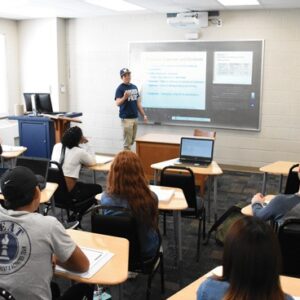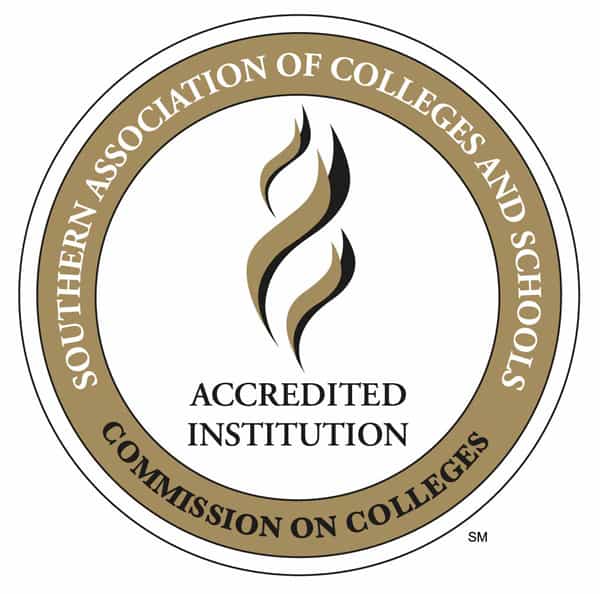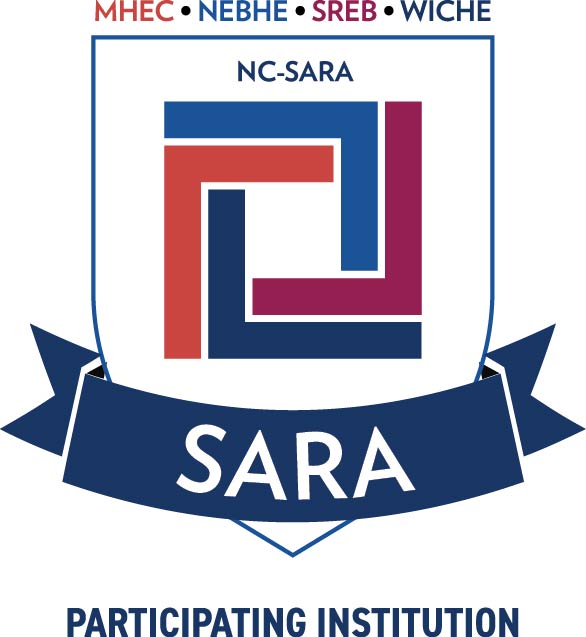North Carolina Wesleyan University (NCWU) monitors student achievement in a variety of ways. Examples include retention from first to second year, persistence to degree (graduation rate), preparation for graduate studies and/or employment, success in securing jobs or gaining admittance to graduate school, and outcomes for licensing examinations. Data for each of these are provided in the Student Achievement and Success Report.
In accordance with the SACSCOC policy statement on Institutional Obligations for Public Disclosure and Federal Requirement 4.1, NCWU provides and annually updates State Authorization, Accreditation and Accountability information regarding its goals for student achievement and the success of students in achieving those goals in the Student Achievement and Success Report. Also, the university provides various resources for student complaint policies and procedures. See below for more details.

SACSCOC Accreditation
North Carolina Wesleyan University is accredited by the Southern Association of Colleges and Schools Commission on Colleges (SACSCOC) to award baccalaureate and master’s degrees. North Carolina Wesleyan University also may offer credentials such as certificates and diplomas at approved degree levels. Questions about the accreditation of North Carolina Wesleyan University may be directed in writing to the Southern Association of Colleges and Schools Commission on Colleges at 1866 Southern Lane, Decatur, GA 30033-4097, by calling (404) 679-4500, or by using information available on SACSCOC’s website (www.sacscoc.org)
For SACSCOC Membership Information about NCWU, check here or search for “North Carolina Wesleyan University” under “Institution Name”.

About SACSCOC
The Southern Association of Colleges and Schools Commission on Colleges is the recognized institutional accrediting body in the eleven U.S. Southern states (Alabama, Florida, Georgia, Kentucky, Louisiana, Mississippi, North Carolina, South Carolina, Tennessee, Texas and Virginia) and in Latin America for those institutions of higher education that award associate, baccalaureate, masters or doctoral degrees. The Commission on Colleges’ Board of Trustees is the representative body of the College Delegate Assembly and is charged with carrying out the state authorization, accreditation and accountability process.
To gain or maintain accreditation with the Commission on Colleges, an institution must comply with the standards contained in the Principles of Accreditation: Foundations for Quality Enhancement and with the policies and procedures of the Commission on Colleges. The Commission on Colleges applies the requirements of its Principles to all applicant, candidate, and member institutions, regardless of type of institution (public, private for-profit, private not-for-profit).
State Authorization of Distance Education
North Carolina Wesleyan University is approved by SARA-NC to participate in the National Council for State Authorization Reciprocity Agreements (NC-SARA).
NC-SARA is a voluntary, regional approach to state oversight of post-secondary distance education. A “State authorization reciprocity agreement”, SARA, is an agreement between two or more States that authorizes an institution located and legally authorized in a State covered by the agreement to provide post-secondary education through distance education or correspondence courses to students in other States covered by the agreement.

Accountability & Student Complaints
North Carolina Wesleyan University Student Complaint Policy and Procedures:
Federal regulations require NCWU to provide current and prospective students with the contact information for filing complaints with the appropriate agency in the state where the student resides. NCWU is committed to providing learning environments in which complaints are responded to promptly and with minimum distress and maximum protection to the parties. To that end, students at North Carolina Wesleyan University who would like to file a complaint with the institution should do so by completing the form online:
Student complaints are processed through the Student Affairs Office:
North Carolina Wesleyan University
Attn: Dr. Joe Lane
Provost and Vice President of Academic Affairs
3400 N. Wesleyan University
Rocky Mount, NC 27804
252.985.5364
JLane@ncwu.edu
University of North Carolina: Post-Secondary Education Student Complaints
northcarolina.edu/post-secondary-education-complaints
The Licensure Division of the University of North Carolina System Office serves as the official state entity to receive complaints concerning post-secondary institutions that are authorized to operate in North Carolina. If students are unable to resolve a complaint through the institution’s grievance procedures, they can review the Student Complaint Policy, and complete the online Student Complaint form. Links to the policy and form are below.
North Carolina Post-Secondary Education Complaints
c/o Student Complaints
223 S. West Street, Suite 1800
Raleigh NC 27603
UNC Student Complaint Policy:
studentcomplaints.northcarolina.edu
UNC Student Complaint Form:
studentcomplaints.northcarolina.edu/form
For more information, call 919.962.4550.
To file a complaint with the Consumer Protection Division of the North Carolina Department of Justice, please visit the State Attorney General’s web page or to file a complaint online: NC DOJ Online Complaint Form. North Carolina residents may call 877.566.7226. Outside of North Carolina, please call 919.716.6000. En Espanol 919.716.0058. If you choose to mail a complaint, please use the following address:
Consumer Protection Division
Attorney General’s Office
Mail Service Center 9001
Raleigh, NC 27699-9001
Students from states other than North Carolina can find their appropriate state entity by visiting the State Authorization Guide webpage for a collection of state laws, regulations, and requirements for institutions serving out-of-state students.
SARA North Carolina Student Complaints
SARA-NC Complaint Process:
www2.ncseaa.edu/SARANC/Complaint.aspx
SARA-NC Complaint Form:
www2.ncseaa.edu/SARANC/docs/SARA-NC-ComplaintForm.pdf
The North Carolina State Education Assistance Authority (NCSEAA) serves as the SARA portal entity for North Carolina with the responsibilities defined by the National Council for State Authorization Reciprocity Agreements (SARA). Among the responsibilities assigned to the state portal entity is shepherding the resolution of, investigating and resolving as necessary complaints from distance education students who reside outside of the state and who have complaints regarding the institutions that participate in SARA North Carolina.
Students not residing in North Carolina and enrolled in a North Carolina institution that operates under SARA North Carolina may submit complaints to NCSEAA only after completing the complaint process established by the institution attended by the student.
Initial responsibility for the investigation and resolution of student complaints resides with the institution against which the complaint is made. Students must exhaust all opportunities for resolution at the institution before filing a complaint with the NCSEAA. Complaints regarding grades or student conduct violations are governed entirely by institutional policy and are not subject to review by NCSEAA.
Students who have exhausted institutional grievance processes and remain dissatisfied with the outcome may file a written complaint with NCSEAA within two years of the incident that is the issue of the complaint. Anonymous complaints will not be reviewed.
Filing a Complaint against a SARA North Carolina Institution
Using the student complaint form, describe your complaint and provide supporting documentation, including the outcome of the institutional complaint process. Follow the instructions on the website to submit your form.
The NCSEAA will review a complaint that falls within its authority within 30 calendar days upon receipt. Qualifying complaints will be forwarded to the appropriate entity, as described below, for resolution:
- Complaints against any of the UNC constituent institutions will be forwarded to the Office of Academic and Student Affairs at UNC General Administration;
- Complaints against any of the state community colleges will be forwarded to the North Carolina Community College System;
- Complaints against any of the independent colleges and universities will be forwarded to the North Carolina Independent Colleges and Universities; and
- Complaints against any other institution will be reviewed by the NCSEAA.
Reviews will be completed within 60 calendar days of the date a complaint is received. Staff representing the entities listed above will conduct initial reviews and submit findings and recommendations for resolution, if any, to the SARA North Carolina Director. The Director may extend the review by an additional 30 calendar days for a total of 90 days if necessary to ensure full understanding of the issues related to the complaint.
- If a complaint cannot be resolved by mutual agreement within the allotted period of time, the SARA North Carolina Director may deem that no action is needed, seek more information, or recommend action against an institution.
- The SARA North Carolina Director may consult with the SARA North Carolina Advisory Council before recommending action against an institution. Action may include direction to the institution to adhere to its institutional refund policy when the institution has not done so voluntarily.
- Any disposition by the SARA North Carolina Director is final with the exception of the decision to take an action against an institution based on a complaint. Should the Director choose to recommend action against an institution, such an action must be approved by the NCSEAA Board of Directors. The recommendation becomes final and binding following the Board’s approval. Nothing in this process precludes the State of North Carolina from using the laws of North Carolina to pursue action against an institution that violates those laws.
- The SARA NC Director will communicate the finding to the complainant and the institution involved in the complaint.
If a student wishes to contact the state portal entities for his or her home state, contact information for state portal entity directors in each SARA state can be found on the NC-SARA website. State by state contact information for agencies responsible for receiving student consumer complaints is available online.
North Carolina State Education Assistance Authority
c/o SARA North Carolina
P.O. Box 41349
Raleigh, NC 27629
Phone: 855.SARA.1.NC (727-2162)
Phone: 919.549.8614, ext. 4667
Email: complaint@saranc.org
Website: saranc.org
Southern Association of Colleges and Schools Commission on Colleges (SACSCOC)
Southern Association of Colleges and Schools Commission on Colleges
1866 Southern Lane
Decatur, GA 30033
Phone: 404.679.4500
Fax: 404.679.4558
SACSCOC Complaint Procedures against the Commission (or Its Accredited Institutions):
sacscoc.org/app/uploads/2020/01/ComplaintPolicy-1.pdf
To file a complaint against an institution accredited by the Southern Association of Colleges and Schools Commission on Colleges (SACSCOC), complete the Commission’s Complaint Form and send two print copies to the President, Southern Association of Colleges and Schools Commission on Colleges, 1866 Southern Lane, Decatur, GA 30033-4097. (To access the Commission’s complaint policy, procedures, and the Complaint Form, please see Complaint Procedures Against the Commission or Its Accredited Institution.
Professional Licensure Information
In order to comply with U.S. Department of Education regulations, all higher education institutions are required to advise students as to whether their curriculum provides them with the eligibility to apply for a professional license and/or certification in the state for which they plan to practice. If you are not a resident of North Carolina, and you are taking an online course or program leading to professional licensure, North Carolina Wesleyan University cannot guarantee whether the course or program meets the requirements for professional licensure in your state. NCWU recommends that you consult with our program contact or the appropriate licensing agency or board in your state or territory – including states participating in NC-SARA – prior to beginning your course of study.
Please click to review national licensing bodies or email our program contact about licensure below:
State Educational Requirements for Professional Licensure by Program
The information below indicates whether the academic program in question:
- meets state educational requirements for licensure or certification
- does not meet state educational requirements for licensure or certification
State/Territories |
Elementary and Middle and Secondary Education |
Nursing* |
| Alabama | Does Not Meet | Does Not Meet |
| Alaska | Does Not Meet | Does Not Meet |
| Arizona | Does Not Meet | Meets |
| Arkansas | Does Not Meet | Does Not Meet |
| California | Does Not Meet | Does Not Meet |
| Colorado | Does Not Meet | Does Not Meet |
| Connecticut | Does Not Meet | Meets |
| Delaware | Does Not Meet | Does Not Meet |
| District of Columbia | Does Not Meet | Does Not Meet |
| Florida | Does Not Meet | Meets |
| Georgia | Does Not Meet | Does Not Meet |
| Hawaii | Does Not Meet | Does Not Meet |
| Idaho | Does Not Meet | Meets |
| Illinois | Does Not Meet | Does Not Meet |
| Indiana | Does Not Meet | Does Not Meet |
| Iowa | Does Not Meet | Does Not Meet |
| Kansas | Does Not Meet | Meets |
| Kentucky | Does Not Meet | Meets |
| Louisiana | Does Not Meet | Does Not Meet |
| Maine | Does Not Meet | Does Not Meet |
| Maryland | Does Not Meet | Does Not Meet |
| Massachusetts | Does Not Meet | Does Not Meet |
| Michigan | Does Not Meet | Meets |
| Minnesota | Does Not Meet | Does Not Meet |
| Mississippi | Does Not Meet | Meets |
| Missouri | Does Not Meet | Meets |
| Montana | Does Not Meet | Does Not Meet |
| Nebraska | Does Not Meet | Does Not Meet |
| Nevada | Does Not Meet | Meets |
| New Hampshire | Does Not Meet | Meets |
| New Jersey | Does Not Meet | Does Not Meet |
| New Mexico | Does Not Meet | Does Not Meet |
| New York | Does Not Meet | Does Not Meet |
| North Carolina | Meets | Does Not Meet |
| North Dakota | Does Not Meet | Does Not Meet |
| Ohio | Does Not Meet | Meets |
| Oklahoma | Does Not Meet | Meets |
| Oregon | Does Not Meet | Does Not Meet |
| Pennsylvania | Does Not Meet | Meets |
| Rhode Island | Does Not Meet | Does Not Meet |
| South Carolina | Does Not Meet | Meets |
| South Dakota | Does Not Meet | Meets |
| Tennessee | Does Not Meet | Does Not Meet |
| Texas | Does Not Meet | Does Not Meet |
| Utah | Does Not Meet | Does Not Meet |
| Vermont | Does Not Meet | Does Not Meet |
| Virginia | Does Not Meet | Meets |
| Washington | Does Not Meet | Does Not Meet |
| West Virginia | Does Not Meet | Meets |
| Wisconsin | Does Not Meet | Does Not Meet |
| Wyoming | Does Not Meet | Does Not Meet |
| American Samoa | Does Not Meet | Does Not Meet |
| Guam | Does Not Meet | Does Not Meet |
| Commonwealth of Northern Mariana Mtns | Does Not Meet | Does Not Meet |
| Puerto Rico | Does Not Meet | Does Not Meet |
| Virgin Islands | Does Not Meet | Does Not Meet |
*Students must be licensed before being admitted into the program
Elementary, Middle and Secondary Teacher Education Program
Contact information for NCWU Teacher Education Program Director:
Dr. Kelvin L. Spragley
Director of Teacher Education/Coordinator of Diversity & Inclusion
NC Wesleyan University
3400 North Wesleyan Blvd.
Rocky Mount, NC 27894
252-985-5165
KSpragley@ncwu.edu
US Department of Education contact information >
Teacher Education Professional Licensure Boards State by State contact information >
Nursing Program
Contact information for NCWU Nursing Program Director:
Crystal Ostheim, DNP, BS, FNP-BC, NP-C, CNE
Director of Nursing Programs and Initiatives
NC Wesleyan University
3400 North Wesleyan Blvd.
Rocky Mount, NC 27894
costheim@ncwu.edu
National Council of State Boards of Nursing contact information >
Nursing Professional Licensing Board State by State contact information >




